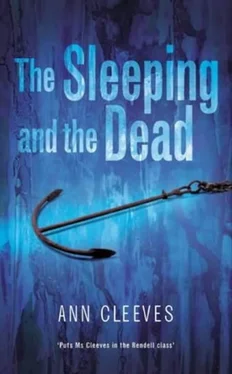‘Quite a tenuous connection then.’
Porteous, who’d been leaning against a table at the front of the room, stood up to answer.
‘Quite tenuous,’ he said. ‘And as Eddie’s said, Hannah Morton has no motive for the Gillespie murder. She does, however, have opportunity.’
He picked up the remote control and another slide was projected. It showed a narrow footpath with a stone wall on one side and a hawthorn hedge on the other. The footpath was crossed with blue and white tape. ‘Melanie’s body was found wrapped in black plastic at the bottom of the hedge.’
He clicked the remote and there was a shot of a lay-by on a main road, the entrance to the footpath. ‘Melanie wasn’t killed where she was found. The murderer must have parked here and carried the body the fifty yards or so to where it was dumped. We’ve already said she was anorexic so she wasn’t heavy. But not a pleasant job. It would have taken nerve.’
Another click and the footpath was seen from a different angle, so it was possible to see over the stone wall to a row of headstones.
‘Hannah Morton admits to having been in the cemetery the evening before the girl’s body was discovered. She claims to have remembered suddenly that Randle had told her where his mother was buried. She found the grave and that’s the information Arthur Lee, the Home Office psychologist, used to dig out the boy’s identity. If she’s telling the truth, then it’s some coincidence.’
The screen went blank. ‘All the same,’ Porteous said, ‘I don’t think we should become too fixed on the Morton connection. Not yet. Certainly there are other avenues to explore. I haven’t spoken to the Gillespies today. The doctor said they needed time. But before Melanie’s body was found they gave important information to the team looking into her disappearance. The case was taken seriously from the beginning because it was thought to be a kidnap. Melanie left home some time after ten, and went to a pub, the Promenade. When none of her friends were there she went to a café on the sea front called the Rainbow’s End. We need to trace everyone who was in either establishment that night. It was the last time she was seen alive, though Carver thinks it more likely she was killed the next day.’
He paused for long enough for them to catch up with their notes. ‘There’s someone else we need to get hold of too. A middle-aged man went into the Promenade looking for Melanie the week before she disappeared. Who was he?’
He let the question hang. Luke’s mobile rang. Embarrassed he fished in his pocket and switched it off.
Ignoring the interruption Porteous went on, ‘This afternoon I’m going to see Stella Randle, Theo’s stepmother, his only surviving relative. Perhaps something will come of that. Some other connection to make more sense of both cases.’
Eddie Stout listened and he thought that his boss had no soul. A fish on a slab had more emotion. Porteous spoke about connections and links as if he were forming a mathematical theory. Not as if a young girl had been stabbed to death. He thought of his Ruthie, excited and dressed up to go out, and said suddenly, trying to shock Porteous, ‘Wouldn’t there have been a lot of blood? A stabbing like that.’
‘Certainly.’
‘Not an easy thing to hide then. There’d have been stained clothes, marks on a floor, walls. Someone would have seen. Shouldn’t we put out the usual plea through the press? Wives and girlfriends who noticed anything odd…’
‘Of course, Eddie. It’s already in hand.’
Porteous stayed behind when they all filed out, collecting his papers into an ordered file. On the way to the door he stopped and glanced behind him. Melanie Gillespie, half turned in the photo, her mouth wide in a grin of recognition, seemed to be looking at him. He had an image of her alone and in pain, heard the screaming. He turned his back on the photo, deliberately distancing himself from the smile. That way lay madness.
Crispin Randle, father of Theo, former Tory MP, had died. Porteous thought, with some satisfaction, that the fat psychologist hanging round with Hannah Morton had missed that bit of information. He’d dug it out from the registrar. Crispin had died five years before from liver failure. The doctors Porteous tracked down suggested that alcohol consumption had been a major contributing factor.
Stella Randle, the widow, was living in Millhaven, in a flat close to the sea front, not very far down the coast from the cemetery where Melanie Gillespie’s body had been found. Porteous had made the appointment to visit by phone and she had been strangely uninterested, rather vague, so he turned up not even sure that she’d be in. The flat was in a crescent built around a communal garden. It had always been a poor Victorian imitation of Georgian grandeur but now it looked shabby and down at heel. A locked wrought-iron gate prevented him from parking right outside so he left his car on the promenade and walked. The grass in the garden was long, the borders overgrown.
Stella Randle opened the door to him herself. She had a faded charm, which matched the building. When he introduced himself she seemed not to recollect that they’d spoken earlier in the day and throughout the interview he was unsure whether her vagueness was genuine or an attempt to deceive. She was in her mid-fifties, dressed in what seemed to Porteous to be a parody of the character she was playing. She wore a pleated skirt, a little cashmere cardigan and even a string of pearls. In her youth she would have been pretty, a little foolish but aware of her limitations. Now she still tried to be girlish.
‘Come in. An inspector. What fun! You will stop for tea?’
There was a wide hall, then a huge high-ceilinged room with a bay window looking out to sea. He had been expecting clutter, furniture from a big house crammed into a flat, but the room was surprisingly empty. There was one sofa – well made but modern – and a couple of coffee tables. On one lay a library book, a romantic novel, face down. The floor had been stripped and varnished and in front of the marble fireplace there was a Moroccan rug of a startling indigo blue.
She must have sensed his surprise.
‘Crispin drank everything away,’ she said. ‘If he hadn’t died when he did the flat would have gone too.’ She looked round the room, saw it perhaps through his eyes. ‘Why don’t we go into the kitchen? We’ll be more comfortable there.’
The kitchen was shabby too but less austere. There were herbs in pots on the window-sill, a bunch of flowers and a brightly coloured oilskin cloth on the table. A portable television stood on one of the counters. A plate and a cup were draining next to the sink.
‘Tea then,’ she said and set a kettle on the gas ring. Still she hadn’t asked Porteous what he was doing there.
‘I’m afraid I may have some bad news,’ he said.
‘Oh?’ She seemed untroubled. Perhaps years of living with an alcoholic had inured her to the possibility of bad news.
‘It’s your stepson Theo.’
‘Theo?’ It was as if she barely recognized the name. She seemed to trawl back through her memory before it made sense.
‘Have you seen him recently?’
‘No, no. Not for years.’
‘Had your husband kept in touch with him?’
‘My husband was very ill, Inspector. Long before he died.’
It was hardly an answer but he let it go.
The kettle gave a piercing whistle. She seemed grateful for the distraction. Her attention was taken up then with warming the pot and making the tea. Porteous set the photograph of Theo as Macbeth on the table. ‘Is that him?’
‘Oh goodness, after all this time, really I couldn’t say.’ She’d only glanced at the picture, was more intent on looking in the cupboard for matching cups among a jumble-sale assortment.
Читать дальше












